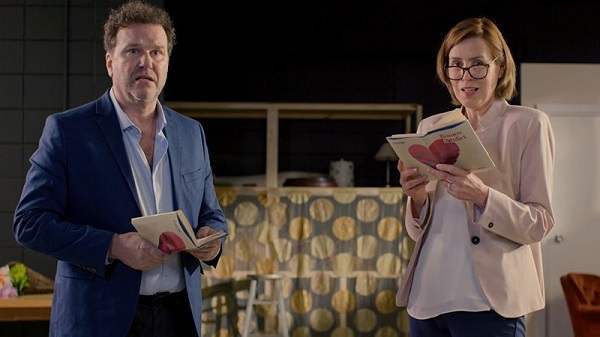
Joan Carr-Wiggin has worked as a screenwriter and director for nearly three decades. The Toronto-based filmmaker made a name for herself with movies like A Previous Engagement and If I Were You.
Carr-Wiggin has a reputation for telling poignant, humourous stories about middle-aged female characters – women with the audacity to wonder what makes them happy! Her latest film, A Grand Romantic Gesture follows newly unemployed Ava (Gina McKee), whose family encourages her to take a cooking class to keep busy. Instead, Ava joins a community theatre production of Shakespeare’s Romeo and Juliet. Cast as Juliet herself, Ava soon develops feelings for her Romeo (Douglas Hodge). The catch? They both have spouses.
We sat down with Carr-Wiggin to discuss her latest project, the importance of dynamic roles for middle-aged women, and the nature of Canada’s film industry. A Grand Romantic Gesture is now available to rent or buy.
Joan Carr-Wiggin On What Inspired Her To Make A Grand Romantic Gesture
As women get older, they’re usually presented in films as if their lives are settled. But older women still feel passion and anger and joy. A woman in her 50s starring in Romeo and Juliet, and feeling the same things as Juliet does in the play, seemed a good way to make that point.
On Why She Writes Lead Roles For Actresses Over Forty
Women of all ages, and particularly older women, do not receive enough representation in movies. There are still too few women directors telling the stories they want to tell. In almost all our movies we have women over 40 as the lead. My usual line is that I have to make movies about older women because if I don’t, who will? We work with amazing actresses who haven’t had as many lead roles as they deserve. Our lead for A Grand Romantic Gesture is the wonderful Gina McKee, starring with Tony winner Douglas Hodge and the great Canadian actress Linda Kash.
On Why It’s Empowering To Let Female Characters Make Mistakes
I get tired of seeing women in films as purely maternal, as if that is enough for a woman. I love my daughter and stepdaughters and grandchildren, but you’re still a person after you’re a mother. And career women are often presented as cold and lonely. In real life, women combine both all the time; we’re complicated, just like men.
On What It Was Like To Enter The Film Industry In Her Forties
My husband, David Gordian, (who produces the movies) and I only entered the film business in our forties. If we had known how difficult it would be, I’m not sure we would have done it. When I was in my early twenties I was accepted into the film program at York University, but I left when they said I would have to make a short film. I only wanted to study films. I couldn’t imagine myself on a set. I began writing scripts when I was home with my daughter, and my husband started showing them to people who told him he was a natural producer. So we really stumbled into the business. And now I’m completely at home on a film set, as the person in charge.
On The Benefits of Being a Film Industry Outsider
It’s hard for me to comment on the Canadian film system because, to a great degree, we operate outside of it. We don’t receive funding from Telefilm, and our films have never been at TIFF, even though they’ve all received U.S. distribution. But maybe we’ve been lucky to strike out on our own. I’m proud of the fact that our movies are exactly the movies that we want to make.


